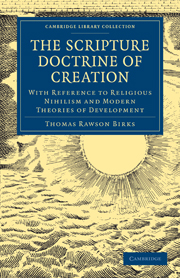 The Scripture Doctrine of Creation
The Scripture Doctrine of Creation The doctrine of creation, revealed in the opening words of Scripture, agrees at once with the most certain conclusions of sound reason, that time and the universe had a beginning, and with the widest results of induction with regard to all the successive generations of plants and animals during the ages of known history. The progress forward, in every case, is not from like to unlike, but from the few to the many; and the only progress backward, which can claim really scientific evidence, is not from like to unlike, from the definite to the undefined, but from the many to the few.
The Theory of Evolution, on the other hand, in its momentary acceptance by so many hewers of wood and drawers of water for the building of the temple of science, and its wholesale substitution of ingenious guesswork for the evidence of facts, seems to hold exactly the same place in Physiology which the hypothesis of vortices held two centuries ago in Physical Astronomy. Each lays hold of a captivating analogy, and rears on it an immense superstructure, without submitting it to the test either of known facts, or of clear and intelligible reasoning. It was known that floating matter was carried round and round in a whirlpool. It was assumed that such a whirlpool of loose revolving matter did exist in the planetary spaces, and that the planets might in this way be carried in their orbits round the sun.
To save this book to your Kindle, first ensure [email protected] is added to your Approved Personal Document E-mail List under your Personal Document Settings on the Manage Your Content and Devices page of your Amazon account. Then enter the ‘name’ part of your Kindle email address below. Find out more about saving to your Kindle.
Note you can select to save to either the @free.kindle.com or @kindle.com variations. ‘@free.kindle.com’ emails are free but can only be saved to your device when it is connected to wi-fi. ‘@kindle.com’ emails can be delivered even when you are not connected to wi-fi, but note that service fees apply.
Find out more about the Kindle Personal Document Service.
To save content items to your account, please confirm that you agree to abide by our usage policies. If this is the first time you use this feature, you will be asked to authorise Cambridge Core to connect with your account. Find out more about saving content to Dropbox.
To save content items to your account, please confirm that you agree to abide by our usage policies. If this is the first time you use this feature, you will be asked to authorise Cambridge Core to connect with your account. Find out more about saving content to Google Drive.